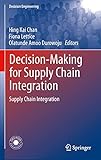Decision-Making for Supply Chain Integration : Supply Chain Integration / edited by Hing Kai Chan, Fiona Lettice, Olatunde Amoo Durowoju.
Tipo de material: TextoSeries Decision Engineering ; 1Editor: London : Springer London, 2012Descripción: xii, 254 páginas 60 ilustraciones, 1 ilustraciones en color. recurso en líneaTipo de contenido:
TextoSeries Decision Engineering ; 1Editor: London : Springer London, 2012Descripción: xii, 254 páginas 60 ilustraciones, 1 ilustraciones en color. recurso en líneaTipo de contenido: - texto
- computadora
- recurso en línea
- 9781447140337
- TA177.4-185
Springer eBooks
1.Adoption of Genetic Algorithm for Cross-Docking Scheduling with Time Window -- 2. A generic knowledge Model for SME Supply Chain Based on Multiagent Paradigm -- 3. Integrated Supplier Selection, Pricing and Inventory Decisions in a Multi-level Supply Chain -- 4. Optimal Pricing with Dynamic Tracking in the Perishable Food Supply Chain -- 5. Identifying Supply Chain Value using RFID-Enabled Distributed Decision-Making for Food Quality and Assurance -- 6. Understanding the Acceptance of RFID in the Healthcare Industry: Extending the TAM Model -- 7. Operational Risk Issues and Time-Critical Decision-Making for Sensitive Logistics Nodes -- 8. Supply Chain Disturbances: Contextualising the Cost of Risk and Uncertainty in Outsourcing -- 9. Product Containment Resources Facilitating Decision-Making in Complex Supply Networks -A Case Study of Milk Distribution from Farm to Retail -- 10. Order Fulfillment - A Key to Supply Chain Integration -- 11. Emerging Technology and the Service Delivery Supply Chain -- 12. Coordinating Parisian Urban Transport.
Effective supply chain integration, and the tight co-ordination it creates, is an essential pre-requisite for successful supply chain management. Decision-Making for Supply Chain Integration is a practical reference on recent research in the area of supply chain integration focusing on distributed decision-making problems. Recent applications of various decision-making tools for integrating supply chains are covered including chapters focusing on: •Supplier selection, pricing strategy and inventory decisions in multi-level supply chains, •RFID-enabled distributed decision-making, •Operational risk issues and time-critical decision-making for sensitive logistics nodes, Modelling end to end processes to improve supply chain integration, and •Integrated systems to improve service delivery and optimize resource use. Decision-Making for Supply Chain Integration provides an insight into the tools and methodologies of this field with support from real-life case studies demonstrating successful application of various decision-making techniques. By covering such a range of topics in this way, Decision-Making for Supply Chain Integration is a useful reference for researchers looking to develop their knowledge or find potential new avenues of research.
Para consulta fuera de la UANL se requiere clave de acceso remoto.


